This post may contain affiliate links. This just means I may receive a small commission at no extra cost to you for helping them promote their product or service. I don’t endorse any services I don’t personally use or recommend.
Scams and tourist traps are commonplace all over the globe. Local entrepreneurs preying on the idiocy and naivety of foreign visitors. We don’t know the prices. We don’t know the customs. And it’s 100% our own fault we fall for it. Egypt’s touts are pretty cunning and very persistent. Ask anyone who hated Egypt why they felt that way and they’ll likely tell a tale of parting the Red Sea of people selling useless garbage in a market and complain of exhaustion from constant haggling. But if you can spot the common Egypt scams ahead of time— you’ll save lots of money and you might even learn to love the country (like we do).
Here’s how to avoid getting scammed in Egypt. Knowledge is power friends.
Haggling in Egypt 101 – Key to Avoiding Common Egypt Scams
Nothing in Egypt has a set price. Almost everything is up for negotiation. Whatever price they quote you— half of that is usually reasonable. Usually. It really helps to ask around your fellow travelers before booking any day tours or buying anything. Then try to beat the price that they got.
Here’s a little list of some common local prices to help you negotiate
- Small glass bottle of soda: 6 Egyptian Pounds (10 is also relatively reasonable) = $0.40
- Small street food like falafel: 5 Egyptian Pounds = $0.33
- Massive shawarmra: 35 Egyptian Pounds = $2
- Water bottle: 4 Egyptian Pounds = $0.30
- Traditional outfit at a market: 200- 250 Egyptian Pounds = $16
- Bedouin Scarf: 35-40 Egyptian Pounds =$2.50
- Private Car from Luxor to Aswan: 1800 Egyptian Pounds = $120
- Cost of 1-hour felucca + sunset tea: 150 Egyptian Pounds = $10
- 30 min Minibus Journey: 8 Egyptian Pounds = $0.50
- 10 min tuk-tuk ride: 25 Egyptian Pounds = $1.60
How to Avoid Common Egypt scams
Let’s talk about the lies, tricks, and carefully constructed plans that Egypt’s touts and street people use to con you out of your money.
But first…
Don’t let the misinformed travel bloggers trick you. You CANNOT see all of Egypt’s highlights in 5-10 days.
It’s not just the aggressive touts ruining your time in Egypt. It’s lazy bloggers. I swear these people are just reading the same blogs, taking the same trip, & then regurgitating the info on their own page.
EGYPT HAS SO MUCH TO SEE.
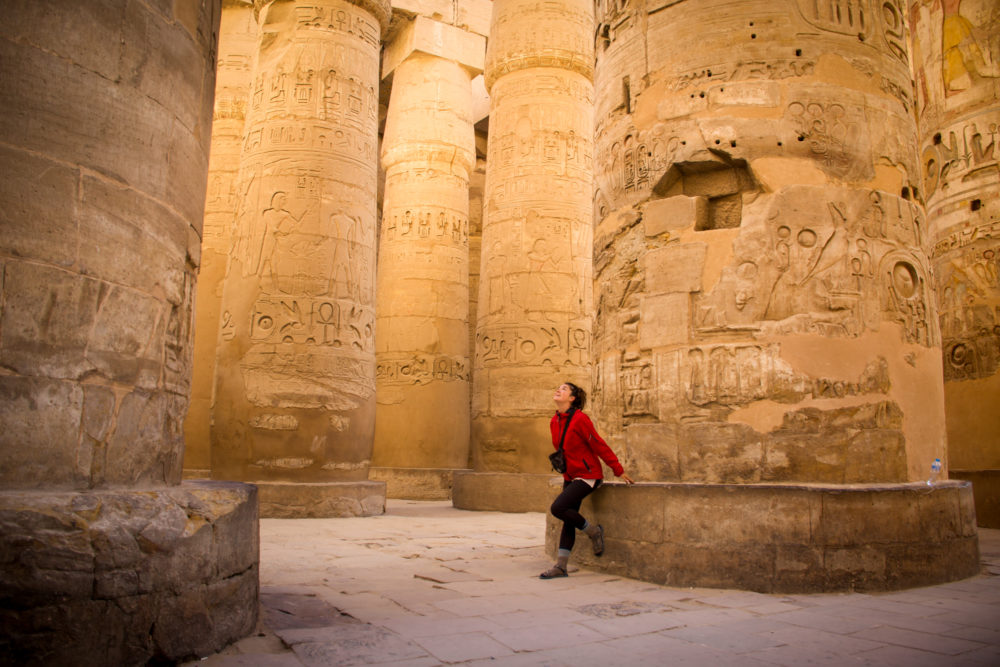
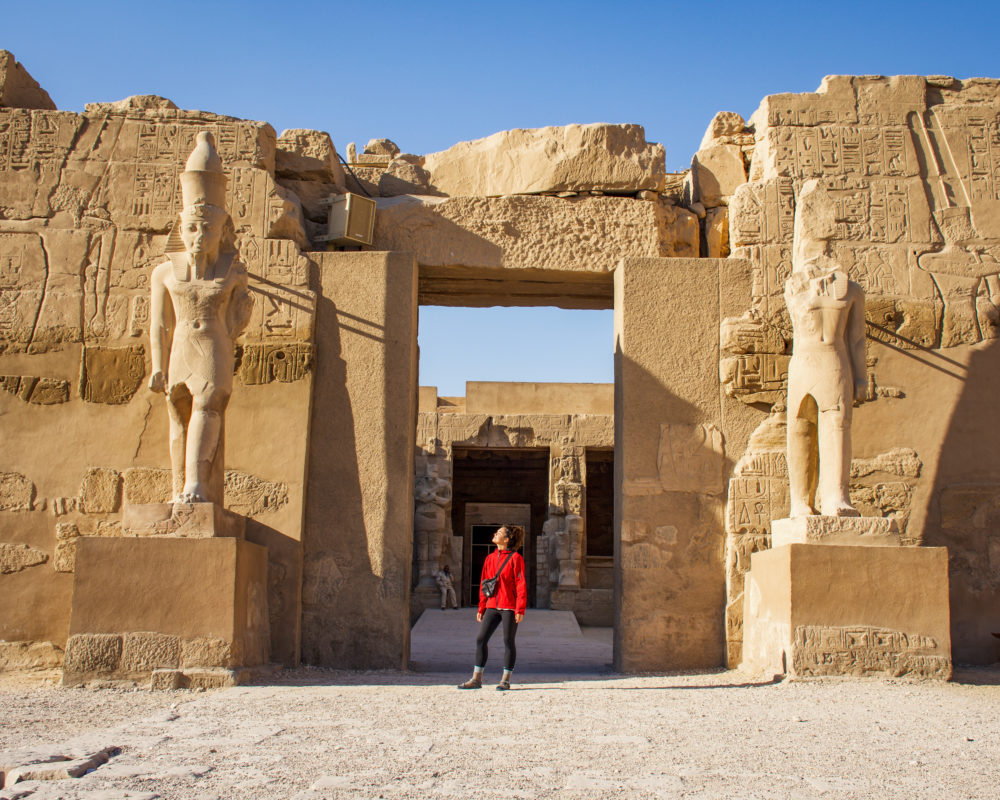
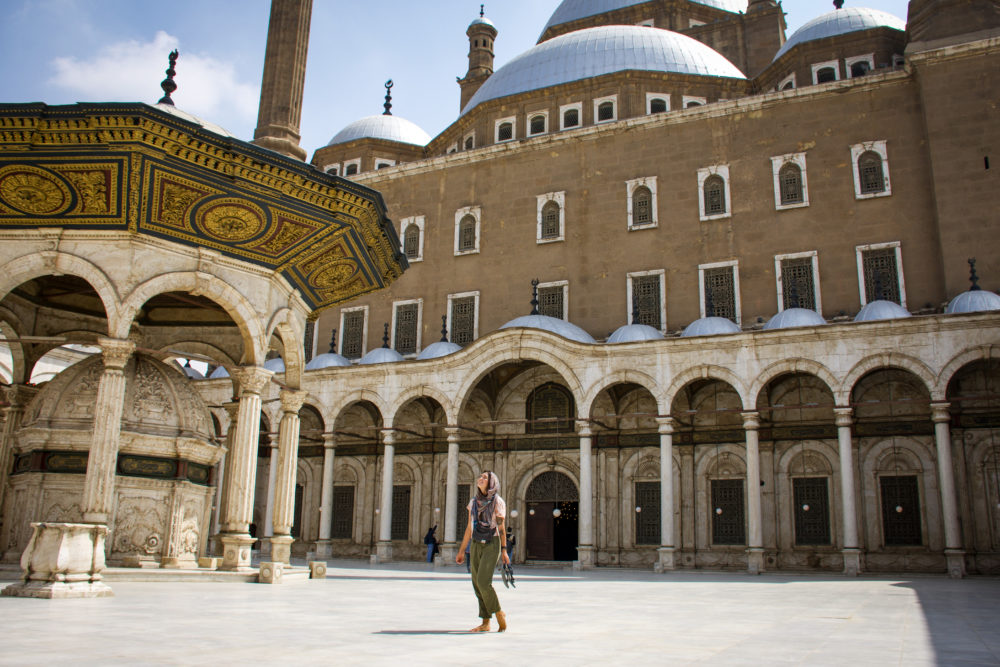

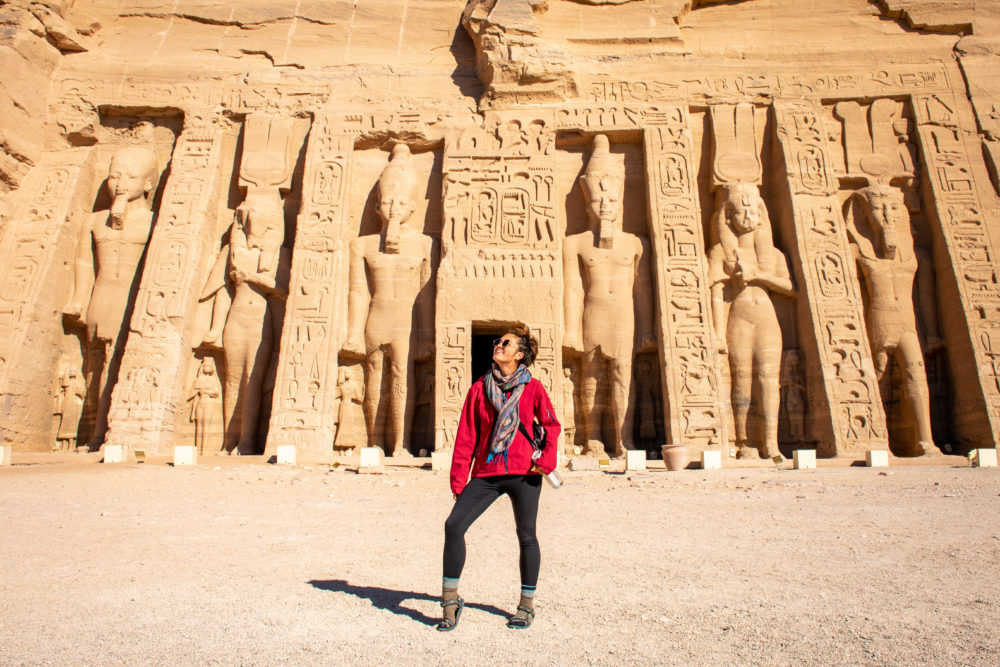
From the desert oasis of Siwa near the Libyan border to Abu Simbel down south by Sudan— it’s a lot of ground to cover. If you have 3 weeks in Egypt you can see MOST of it. But even then there’s a lot you’ll have to skip along the way.
Don’t be fooled, you need more time in Egypt than you think.
Now let’s dig into the common Egypt scams.
There IS a daytime bus from the airport.
They will tell you there isn’t, but until 6 PM it runs regularly into downtown Cairo. Just step outside, take the free blue and white shuttles to the main bus station and ask around for a bus downtown. It should cost you 5 Egyptian Pounds for the 40-minute ride.
The Great Pyramids of Giza
This deserves its own section entirely. As far as elaborate scams go—the pyramids take the cake. There are touts everywhere. Fake ticket checkers. Fake security guards. Horse buggies and camel riders. Avoid them all.
Here are the 5 rules you should follow when visiting the great pyramids to actually enjoy your time there.
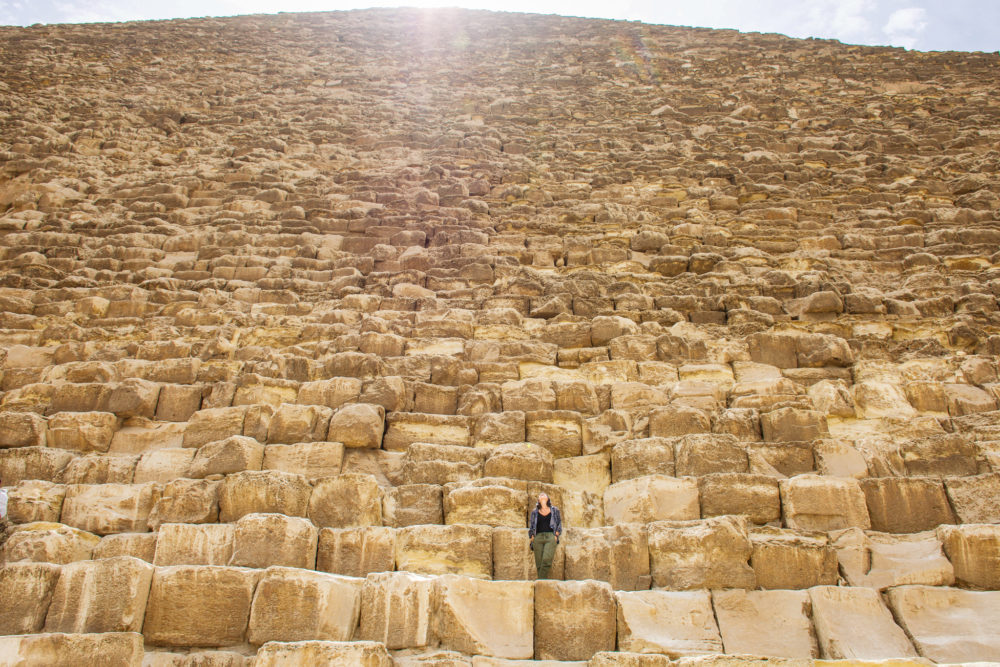
1. Don’t ever show your ticket to anyone after the visitor center.
These guys standing on the walkway to the first pyramid are fake. They just want to tell you you bought the wrong ticket and it’s “x” Egyptian pounds more to enter this gate.
2. The Pyramids Never Close & The Entrance is Easily Found.
It’s at the visitor center. This is where you should start. You’ll purchase your ticket here. If you choose to visit independently via Uber (a great option) or minibus just ask to be dropped off here.
3. Never get on a camel. Or a horse carriage.
For starters, you can easily walk between the pyramids- it takes 5 minutes. Secondly, they often say only 50 pounds ($3) but they DON’T mean it. Once you’re on the camel it’s going to cost you 300 pounds to get off.
There are official government signs that say a 1-hour camel ride is 350 pounds per person. Expect that price. No, demand that price. If you do want camel photos, go to the viewpoint at the top of the hill here… and you’ll get stunning photos with the goofy animals. You can bargain for a cheaper price + I met several people who spoke Arabic and managed to get them down to 150 EGP for the camel ride.
4. Don’t let anyone take a photo for you or pose for a photo.
They will demand a tip.
Unless they want a selfie with you— they are probably gonna ask for a tip. Lots of people (regular people) want photos with tourists. Still not sure why–especially in places that are popular with foreign tourists. But those selfies are well-meaning and they don’t ask for money after. You don’t have to say yes to the selfie though if it’s not something you’re comfortable with.
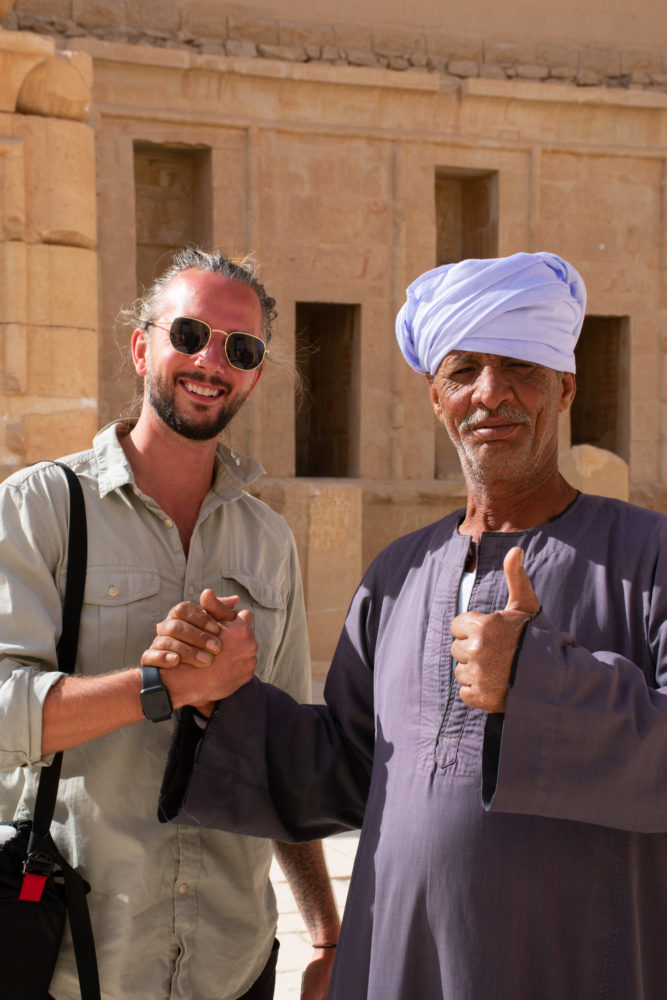
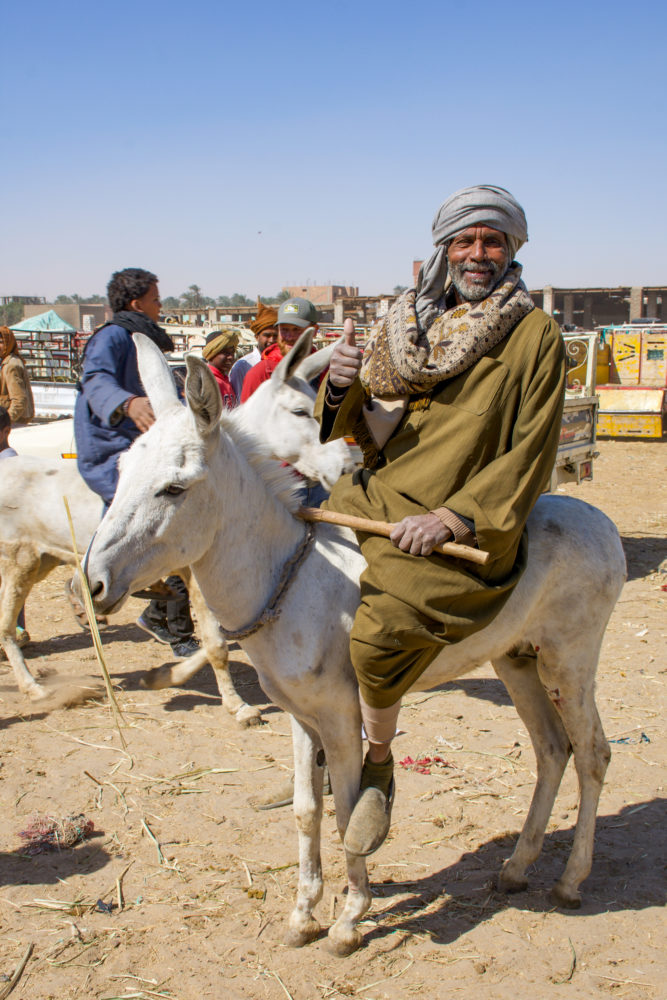
5. Don’t buy any trinkets here.
They are all fake & massively overpriced. The same goes for water, snacks, basically anything you might need to purchase in the area. Everything at the pyramids is extraordinarily overpriced.
For a whole load of tips on getting the most out of your visit to the pyramids be sure to check out my full blog post on Egypt’s most worthwhile attractions.
Kids will sell you Kleenex.
Egypt is full of runaway homeless kids. It breaks your heart. This is why I carry around small bills and coins or candy to give them. Nothing big, but it does help to ease the guilt. The Kleenex is 5 pounds per pack and it’s so dusty everywhere we were always using them. But be warned they will run away and not give you your change so try to pay exact.
Don’t get suckered or bullied into a tour of a Mosque.
You do not have to pay to enter most mosques. If you do there will be a clear ticket booth. If someone just happens to walk in at the same time as you (or is waiting just inside) and jumps right into a detailed explanation of the mosque’s unique architecture or tries to walk with you while chatting— kindly but firmly tell them you don’t need a tour.
They will wait until the end to tell you that was a tour and expect you to fork over up to 100 pounds ($7).
People who help you on the street usually want something.
Obviously, it’s no good to be distrustful of everyone you meet because Egypt does genuinely have some of the most giving and kind people I’ve ever met while traveling, but not everyone is just a good samaritan. Often someone would help us with a menu, invite us in for tea, or give us directions only to then turn around and try to sell us perfume or a taxi tour. One minute I’m looking for a falafel shop and the next thing I know I’m sitting at a table with a cup of “free” hibiscus tea and an array of perfume spread in front of me.
It doesn’t hurt to have your guard up a little bit.
Here’s a quick list of tourist traps that you should avoid at all costs.
I’m not talking about “touristy” places. Khan el Khalil is touristy but there’s still merit in visiting the market. These are places with NO value to you and where they are only looking to squeeze money out of you. (Funny how almost all of these places are in Luxor…can you tell what my least favorite city was? )
- The Blue Mosque. (Cairo) It’s expensive and the least impressive mosque in the city. Well maybe not the least- but it’s not worth visiting.
- The Alabaster Shop/Factory (Luxor)
- “Government Market” (Luxor). Often they will say it’s only open today or that everything is 50% off just today. Neither is true.
- Crocodile Island/Banana Island (Luxor) Just a small sad island with some caged underfed animals.
- A sunset felucca (local boat) ride in Luxor. It doesn’t go anywhere. Just circled around the crowded dirty area of Nile. Aswan has a far more scenic stretch of Nile. If you want to be on the river for sunset in Luxor just take the 5-pound (Egyptian) ferry from the East to West Bank (or vice versa) and sit on the upper deck.
Speaking of the ferry in Luxor…
The Public Ferry is 5 Egyptian Pounds per person. Always.
Yes, even at night. There is one particular ferry ticket operator who tries to convince you it’s more. 10-20 pounds. But if he gives you the wrong change just smile and shake your head and he’ll give the proper amount.
Is everything in Luxor a common Egypt scam?
Don’t let anyone buy your ferry ticket for you. Or really any ticket for you.
The only reason they do this is to overcharge you. I even had a guy working in cahoots with the ferry operator who both insisted the price was 25 pounds rather than the actual 5 pounds.
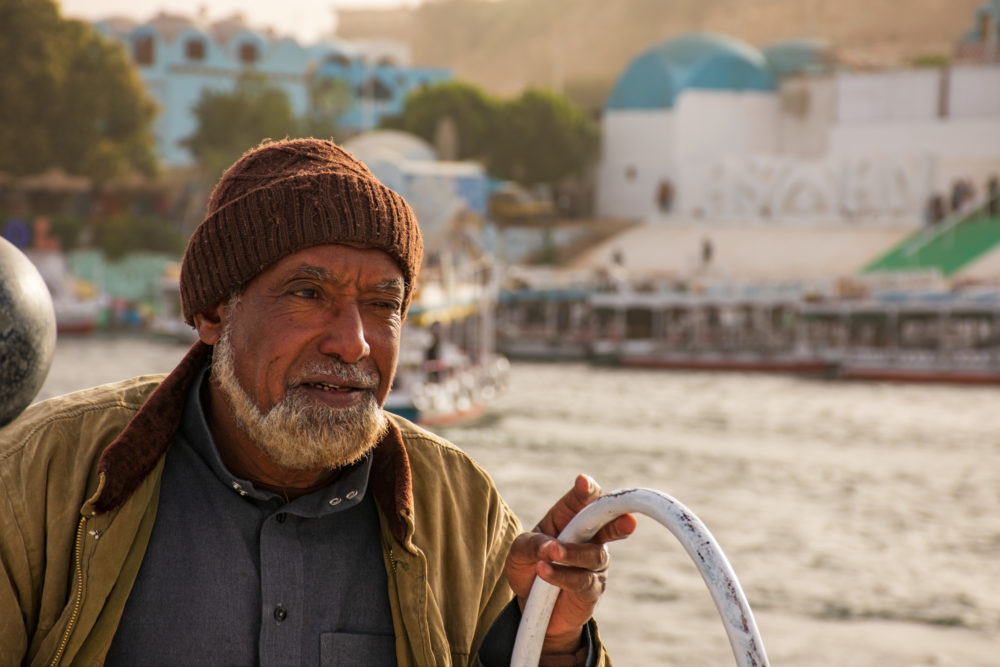
The ferry does not close.
There seems always to be a public ferry option. Maybe if you are traveling past midnight you might encounter trouble finding your way across. But we rode the public ferry at 11 PM. Don’t let anyone tell you it closes after dark.
This is a common Egypt scam all over the country. All over the world actually. Most often the attraction you’re looking for is not closed.
Know how you’re getting from the train station to your hotel. & how much it should cost.
They always get you at the train station. Taxis try to charge ridiculous amounts, a guy offers to “help” get you there. They all just want a cut of the money. Luxor is the most difficult.
If you’re staying on the West Bank of Luxor (which you should) you can literally walk from the train station to the ferry and then pay the 5-pound ticket to cross. You’ll likely be able to walk to your hotel from the other side as well. Don’t even bother with taxis.
The Egyptian Custom of Saying “Oh don’t worry, you pay later” when you ask the price.
We encountered this at quite a few guesthouses and hotels. I don’t think this is technically a common Egypt scam BUT it’s a really unpleasant custom. They would offer dinner, coffee, tea, breakfast, laundry, etc. but wouldn’t be forthcoming about the price. It’s not rude to tell them you want to know beforehand. Because often if you don’t— it will surprise you in the end.
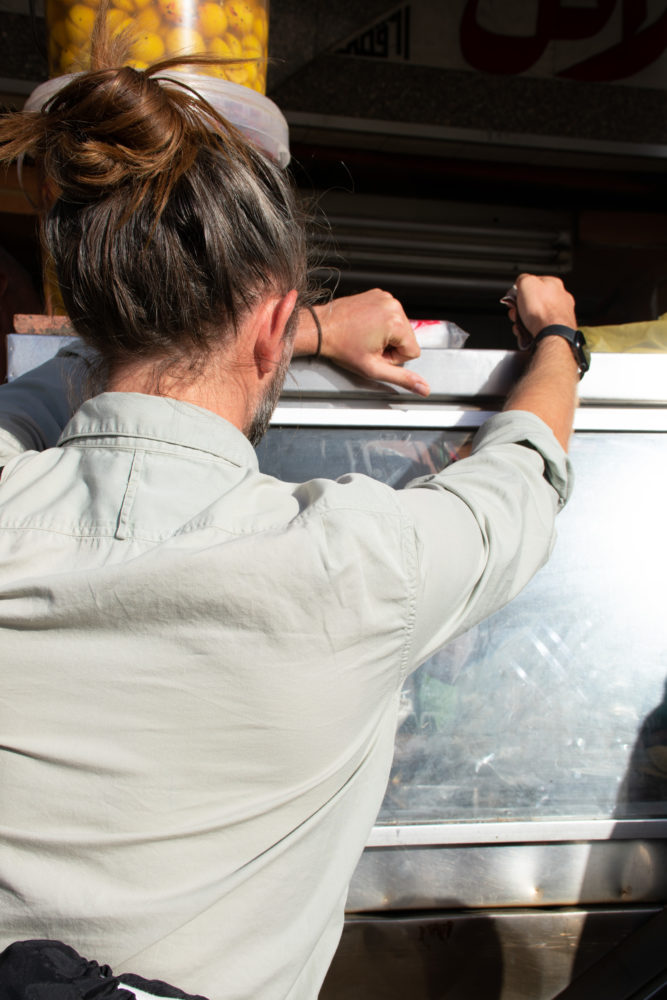
Note: Typically in your hotel coffee is an extra charge while tea is free. The tea is better anyways. & that’s coming from a full-fledged coffee addict.
Be cautious of accepting free stuff.
Whether it is a cup of tea or a small gift. They probably will guilt you if you don’t buy anything later. But remember it’s always okay to stick to your guns and just say no. They were the ones who said it was free in the first place.
How to Say No to Touts
In all our travels the touts and vendors of Egypt are perhaps the most persistent. You’ll often have to say no 1,000 times before they actually leave you alone. Be firm and insistent. Often it helps to speak a little Arabic. Here are some useful phrases that make you seem a little less like a helpless tourist for them to target.
La la la la – No, no, no, no
La Shukran – No thank you. (Pronounced like “La Shook Ran”)
Also, we were told, “Ana Mush Aharaga” means something along the lines of I’m not a dumb tourist. But I can’t find the proper translation to confirm.
Inshallah is my favorite Arabic word. And it can be used to get you out of all kinds of situations. Literally, it means “God willing”. I will often use it when a salesman is trying to make me promise I will come back to his shop or visit tomorrow or buy something later. 90% of Egypt is devoutly Muslim and they typically leave it at Inshallah.
Not common Egypt Scams, But Useful Tips to Save You Lots of Money
Prices vary wildly in Egypt. For example, you’ll definitely get cheaper prices if you can speak Arabic. Even more, if you speak Arabic and also look like you might be from Egypt (like our friends). Even the Arabic menus had cheaper prices than the English-printed ones. Obviously, you’re probably not going to learn Arabic specifically for this trip BUT if you meet a friend that does it will help.
Here are some other rules to follow to save yourself loads of money.
Literally NEVER get coffee near a temple
Coffee should cost around 15 Egyptian Pounds. We saw it listed as 50 Egyptian Pounds at many temples. Sodas and food of all kinds had similar markups. Don’t eat near the temples. Even if you do find a place that is relatively cheap I promise you the portions will be tiny and the quality poor.
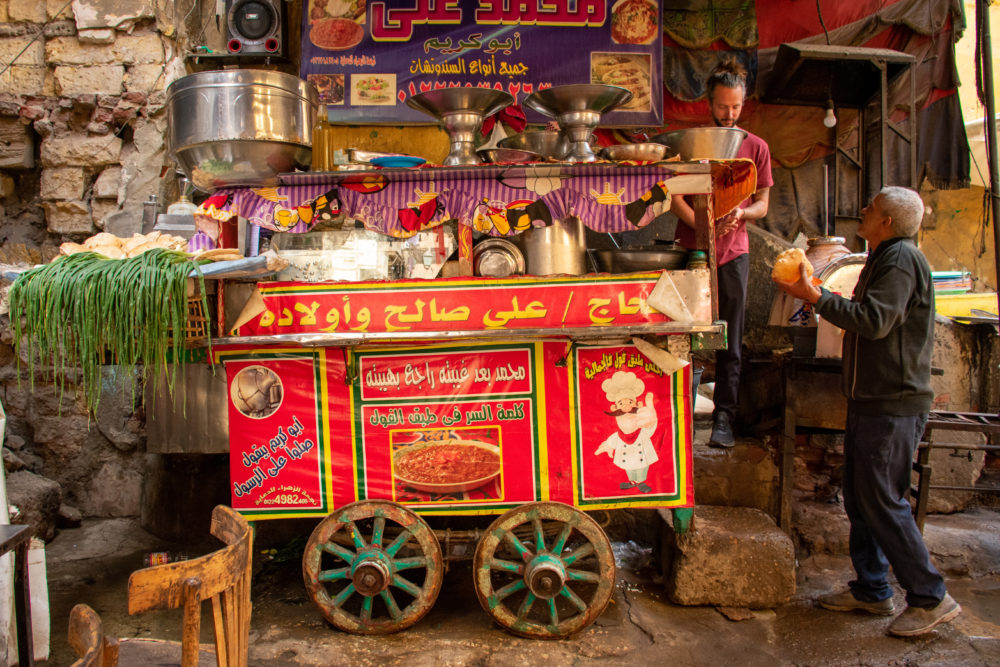
Always ask the price in advance.
Especially with food. Often I find myself thinking…it’s just street food how bad could they rip me off and that’s when they get me. Once you’ve eaten it, you have little to no negotiating power.
Don’t Pay Extra ATM Fees
This goes for every foreign country but when an ATM asks you if you would like to “continue with conversion” or “continue without conversion” always choose WITHOUT. As long as your card doesn’t have foreign transaction fees that is. (If it does you need to get this capital one card ASAP, start banking with Capital One and save yourself some money.)
This will save you lots because the bank conversion rate is horrible. This is how they make money off your transaction.
A private car is NEVER CHEAPER.
I don’t care how many people you are splitting it with…it’s literally never cheaper than the train or bus. Just keep that in mind. Yeah, it might be better comfort-wise but you can always get a better financial deal elsewhere. So weigh your options.
Accommodation is cheapest booked in person.
Although it can be tempting to book in advance, flexibility saves you money in Egypt. Also, you get a far better deal when you pay in person and in cash.
My recommendation: Secure one night at an accommodation a few days ahead of time + then extend with them in person. They will often give you a better deal if you ask.
Always Use Uber in Cairo.
Cairo is one of the only cities in Egypt (Hurghada does as well) with Uber. Aside from walking or taking the underground Metro, this is always the cheapest option.
If you’re like me and don’t travel with a SIM card, walk. Or FYI a typical tuk-tuk ride (for tourists) is around 10 Egyptian pounds per mile.
You can visit Khan el Khalil Market, but don’t buy.
This aesthetically pleasing chaotic tourist market is probably the most expensive place to buy anything in Cairo. If you do plan to purchase anything maybe grab a traditional coffee or snack on pigeon stuffed with rice at Alzhraa Restaurant (it’s in the line of restaurants with outdoor seating on the edge of the market– green label with yellow writing on the sign). Then the price tag is slightly more justified due to the experience.
You are officially ready to navigate Egypt like a pro. The biggest hurdle is learning to spot the common Egypt scams. But now you can walk the streets of Cairo with confidence. You are ready to take on the scams and get to the heart of this wonderful country. Because truly Egypt far exceeded our greatest expectations and we wish that we had planned even more time to enjoy the country. Feel free to reach out via Instagram if you have any questions whatsoever regarding Egypt or navigating the tricky world of scams in the country.
Save Yourself the Headache & Join a Tour!
This is not the cheapest way to visit Egypt and not the way we visited the country either. But it’s a great option if you aren’t feeling comfortable navigating the day-to-day haggling and hectic environment of Egypt.
Save This Post For Later!
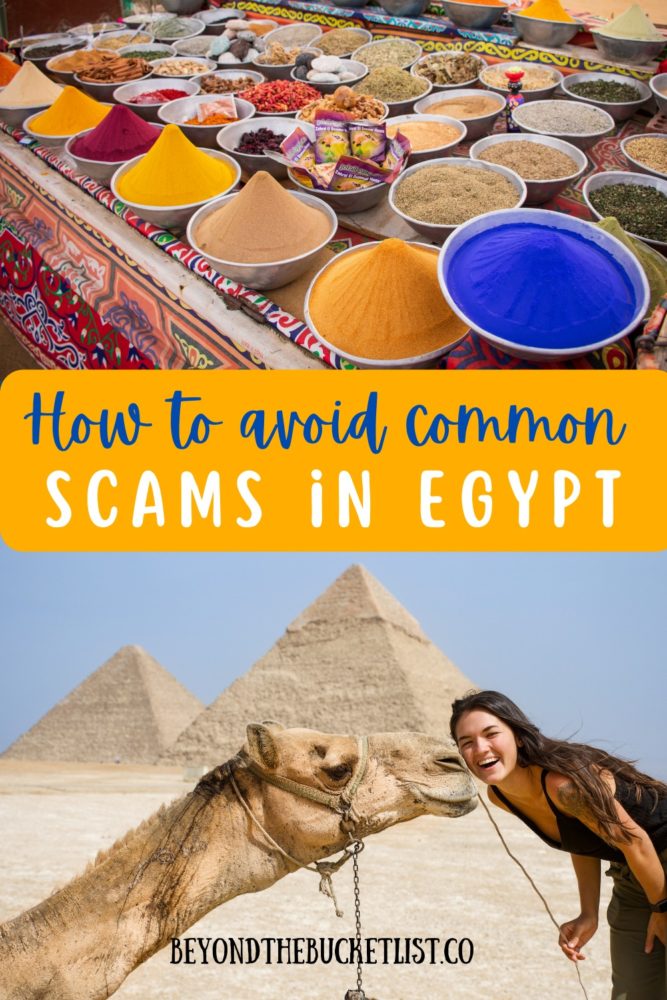
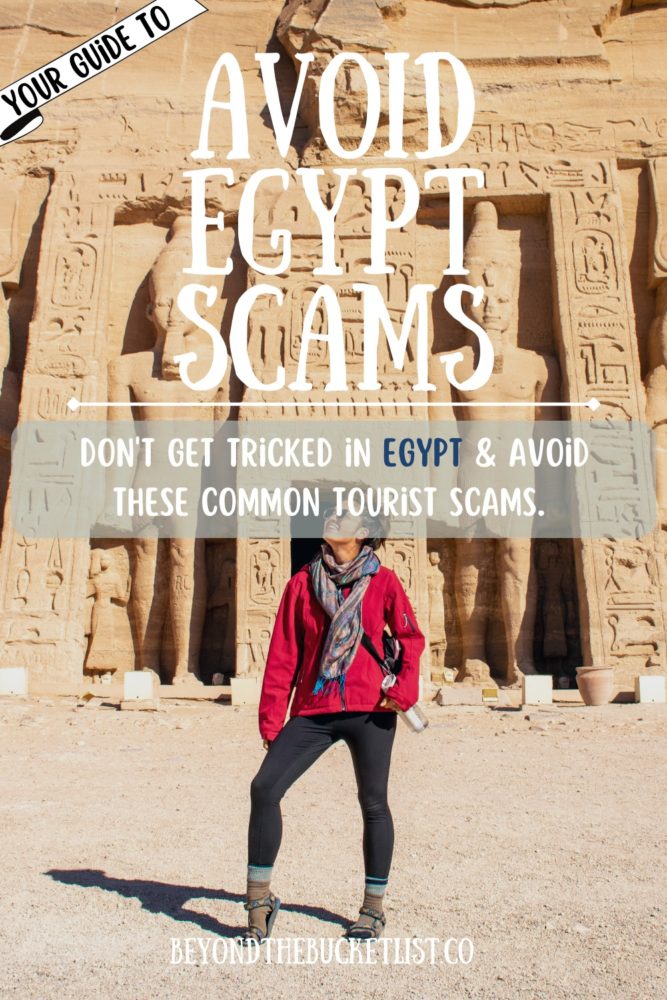

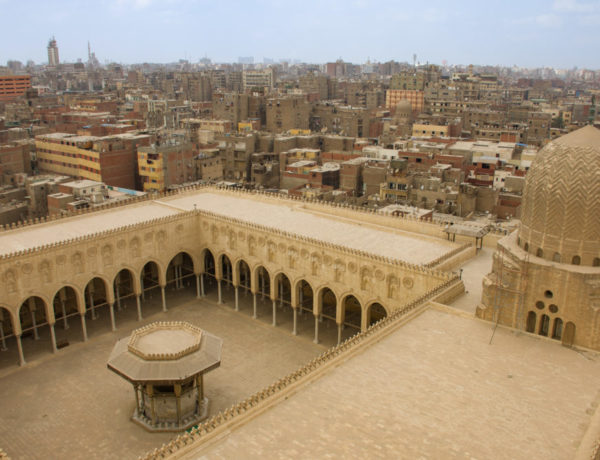
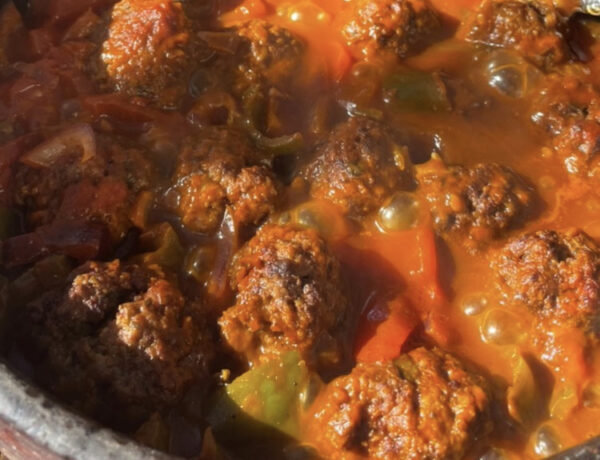


3 Comments
Amanda
July 9, 2023 at 8:23 pmCan someone in Egypt go to jail for not paying their phone bill of 2000 pounds?
Dbog
January 24, 2024 at 7:15 pmthis statement is VERY misguided: “You’ll often have to say no 1,000 times before they actually leave you alone.”. Saying ANYTHING is the problem! Avoid eye contact, say nothing, walk and dont stop. Do not acknowledge scammer/peddlers existence. saying “no” engages you in conversation and immediately gets a response from them. Treat the crowds of scammers like a gauntlet. know where you want to go and get there without looking at anyone. By the time our family finished our 9 days of touring, we were experts at running the “gauntlet”, and actually made a game out of it. .
admin
January 27, 2024 at 12:09 pmThis also works haha. I’m naturally someone who always looks people in the eyes and it’s a hard habit to break. But yes, if you can manage to not engage at all that’s your best bet!